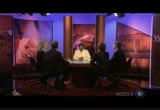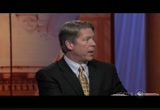tv Washington Week PBS February 25, 2011 8:00pm-8:30pm PST
8:00 pm
at home, democrats and republicans prepare to square off at the u.s. capital and around the nation. >> what we're doing right now is not about using the budget not at all, it's about balancing the budget. >> they're not trying to balance the budget. they're trying to destroy collective bargainingful gwen: and president obama reverses himself on gay marriage but not completely. covering this eventful week martha raddatz of abc news. major garrett of the national journal. and karen tumulty of "the washington post" and pete williams of nbc news. >> covering history as it happens. live from our nation's capitol, this is "washington week" with gwen ifill.
8:01 pm
produced in association with national journal. in association by -- >> we know why we're here to connect our forces when they need it. >> to help troops see the danger before it sees them. >> to answer the call of the brave and bring them safely home. >> around the globe the people of boeing are working together to protect and serve. >> that's why we're here. >> a lion is a powerful thing. it connects the global economy to your living room, cleaner air to stronger markets, factory floors to less crowded roads. today's progress to tomorrow's promise.
8:02 pm
norfolk southern. >> corporate funding is also provided by prudential financial. additional funding for "washington week" is provided by the annenburg foundation. the corporation for public broadcasting and by contributions to your pbs station from viewers like you. thank you. >> once again live from washington, moderator gwen y fill. gwen: good evening. for weeks we've been transfixed by the following dominos in the middle east. from tunisia to asia to yemen. we have witnessed real life upheaval with real life consequences. tonight libya is in a civil war as muammar qaddafi clings to power. this is how one of gaddafi's son
8:03 pm
describes the stand off. >> we have plan a, plan b, plan c. plan a, is to live and died in libya. plan b is to live and die in libya. plan c is to live and die in libya. gwen: the state department suspended operations in tripoli today and the white house announced new sanctions against the libyan government. >> it's clear that colonel gaddafi has lost the confidence of his people. he is overseing the brutal treatment of his people, the -- the fatal violence against his own people and his legit massy has -- legit massy has been reduced to zero. gwen: ben reduced to zero. that's fairly strong language
8:04 pm
coming from an administration which has been sixes and sixes and sevens over the last upheavals in the last couple of weeks. >> but if you look at all these upheaval, libya is so terrifying because muammar qaddafi is firing on his people with heavy weapon. this is opening fire with huge military weapons, sending fighter jets up, sending helicopter jets up. and the reports out of there -- we don't really faux what's going on in libya. we especially don't know what's going on in tripoli. but the reports you are getting from set zins there are just -- citizens there are just terrifying, thousands dead. but from what we've heard it is like no other place and you have a leader who's clearly losing it. if he hasn't lost it already. gwen: and the u.s., people look to us to say we're going to fix
8:05 pm
this. we're going to the very least assemble an international group to get this back -- do something. but what? >> they talked about sanctions today. obviously, unilateral sanctions, multilateral sanctions, all these sanctions and i thought today, isn't that a bit late? you've got a leader there who's saying just crazy things to his people. again, you've got the weaponry and you've got big parts of the country that have already fallen to these protestors. you have no one in charge. you have an incredibly weak military there. totally unlike egypt. this is not a respected organizations. you have defections of military. they have worked for gaddafi for years. he wanted a week military because he didn't want to be overthrown in a coup like he did in 1969. so he's kept his military very weak. and it is very weak and their defecting.
8:06 pm
but he's got these militias. he's got after cans who he trust. -- africans. he said he would give ever family $400. that's not going to do it. >> they're saying they're put ha lewis nagenics in the coffee. is this how he has always been? >> if you look back at gaddafi's history, he's been pretty wacky. >> and cruel. >> of all the whackiest people, he's been the whackiest. he's -- he has a very, very cruel and brutal background. i think he probably lost it long ago. the u.s. clearly tried to deal with him and the international
8:07 pm
community did as well especially over nuclear positions because they wanted him to give up the nuclear position. they had to engage with him, with the family. but when you have somebody who's already losing it under pressure like this, they lose it even more. >> but one of the ideas we keep hearing about to sort of put the lid on the military is to establish a no-fly zone. is that practical and how quickly could something like that be done? >> i love that they keep talk about this no-fly zone. i can't imagine this could happen. it can amount to an act of war if you had a no-fly zone. it's still a sovereign country. if you don't have permission to land there, you can't do that. i think a no-fly zone is not a reality here. but they're panicked in some ways because they want to do something. if you have people just slaughtered in there and it gets worse and it gets more panicy
8:08 pm
what do you do? >> there's been some sense the administration hasn't been in action. is one of the underliing reasons has been to get the u.s. citizens out? >> absolutely. that's the exact reason that they've backed off on the rhetoric. they didn't name colonel gaddafi by name. they didn't want to personalize it. they didn't want him to be more unstable. so they've been very careful with that. we do have the americans out. the u.s. embassy has suspended operations there. so they really pretty much just shut down things and got people out. we'll have to see the next day. >> how much is this complicated by what's going on in egypt and how less egypt is stable? would it be easier for us to know what's going on? >> we probably would and probably mubarak -- in that sense, i guess it would but the whole region as you know is blowing up in so many ways.
8:09 pm
>> that coulden be truer. we have to turn from the trauma in libya to the drama in washington, the hand to hand arguments of collective bargaining rights. the one thing they seem to have in common is that no one anywhere seems prepared to compromise. in washington there's much talk of a looming government shutdown. how major, did it come to this? >> on the shutdown scenario house republicans wanted to take the mandate from the midterm elections to cut federal spending on the discretionary spendsing level. senate democrats said they weren't interesting to go as far as house republicans. today senate democrats have changed. there won't be a government shutdown. it's not going to happen. the white house is more than
8:10 pm
willing to look at these set of cuts in large measure because 70% are earmarks and 30% are taken from the president's own project to terminate projects. we're going to get a deal on that smaller matter. the larger issue about how much to cut still has to be teased out and sorted out. but the shutdown clock, we have one at national journal. we may take it down. gwen: everybody's interested in the finger pointing. that guy's more irresponsible. is that what we had going on? >> there's a big difference between now and 1995 and 1996 -- gwen: the last time this happened. >> the federal deficit is 10 times as it was. it's very clear that if this happens this time, there's not going to be a winner, that the responsibility, we don't have congress entirely controlled by one party as we did back then. and we have a situation where
8:11 pm
the public knows -- they've seen this movie before. and again, it's very clear you look at the polling. there was a gallop poll this week where essentially people were blaming -- they were saying they're not particularly approving of either side's way of cutting the deficit. they do want for them to get into an agreement of some kind. gwen: there's not only the dispute in washington but also the dispute in madison, wisconsin. there's something real underneath all of this. >> you really do have to separate the issue in terms of the actual issue versus the political agendas that are out there. because the fact that every single state in the country is dealing with a really terrible deficit and a long-term structural deficit as well. but you look at a place like wisconsin and people are, you know, remember rahm emanuel's
8:12 pm
line "you can't let a good crisis go to waste." that's the instance with scott walker. is he trying to end collective bargaining in the name of solving a fiscal problem? gwen: the focus has been so much on government workers. why is that -- i mean, do they have some great deal that we don't know about? why is it so focused on them? >> well, in the case of wisconsin, what governor walker has said, look, our legacy costs are built into the state budget in part because of collective bargaining. pensions, salaries have been negotiated. if we don't change the way they're negotiated, the unions will badger the state legislature into increasing their legacy cost. well, that's a theory. it's not really proven out and the budget crisis can be solved with concessions that the labor unions they're willing to make. they just don't want to have their union collective
8:13 pm
bargaining rights either constrained or destroyed depending on your perspective. >> but we are seeing public employees under the gun including in place s like new york where governor cuomo, they're going to have to be giving up some major concessions. it's in part because so much of state and local costs are salaries and benefits. and it's in part, i think, because a lot of people in the private sector have seen their own benefits cut back. they're saying, i love my -- >> it sounds like a lot of companies. >> it's like saying, i love my teempers but i have -- teachers but i love my health care. >> do teachers, for example, have more favorable benefits than the average americans does? >> it depends on how you slice and dice these numbers. generally if you i just local and federal worker salaries with
8:14 pm
age and education because they tend to be older, they tend to be more educated, they sort of balance out to what private sector salaries are. the benefits are particularly better after you retire. a lot of government workers, most of them now have real pensions, only 1-7 work ners the private sector. >> but to become a teacher you should be certified. they should be paid more. they believe they're a more qualified employee -- gwen: the interesting things under all of this not only in the fight in washington and the state capitols is that nobody lives in the middle anymore. the word compromise is a bad word. we actually heard john boehner say that. we saw this picture of this issue of "national journal." in it you see on the left bob dole holding up a phone and smiling. on the right robert byrd, he was the senate democratic leader. dole was the republican.
8:15 pm
behind there are eight members of the senate. four republicans, four democrats. all of them grinning. that was 1988. all of them gone, right? gwen: not all of them. but the big mover is still there front and center. it wouldn't happen again that picture could not be photographed. >> you wouldn't see that celebratory bipartisan before. in the mid to late 1980's, there was an idea that bipartisan was not only effective but good and politically valuable. that is almost -- that concept is almost completely disappeared. in week's "national journal" we have this week's vote ratings. what we found is we compared to the first year of "national journal" back in 1982. you had some extravagant individuals people who were sort of out of this ideological main stream. ed zorensky was the most conservative republican. there were 58 senators in
8:16 pm
between those two polls, ok? in 2010 when you took the most liberal republican and the most little bit cal democrat there wasn't any in the middle. in 1928 in the house the numbers were 344 between the polls as i've just described them. in 2010, seven. >> is it because in the end, there is no -- there is no incentive? there's nothing to be gained from getting along for agreeing? i mean, we see john mccain who once was considered the maverick, now among the most conservative members of the senate. >> i think a lot has to do with particularly in the house the way the district lines are drawn. people come from very liberal districts or conservative districts. you're not going to get challenged in the general election as often as you get challenged in a primary. there are fewer and fewer swing districts left. but you know, gwen, i think ultimately, people do expect
8:17 pm
results from congress and from washington and what we've seen is the last three elections over the last four years some parties have been kick odd the curb because they haven't produced results. and at some point people are going to get the message. gwen: what is the trend line though? >> well, the trend line is quite clearly toward partisan on both sides embedded, entrenched reinforced partisan. but that doesn't mean you can't get ruments. 2008 created an enormous house democratic majority and a large senate democratic majority. it's the most productive in history. doesn't mean you can't get results. when you that kind of partisan direction, you have a snapback. so voters are moving back and forth but the politicians are staying true to these ideological rails in a way they
8:18 pm
didn't 10, 15 years ago. >> certainly one of the reasons i think that you're seeing so much of this turmoil in the midwest is that it's also where you saw very big gains. new republican governors, large republican majorities in these legislatures. it's kind of the mirror image of what we saw in washington the last two years. they feel they've just been elected and they want to get some stuff pushed through. >> but how did the middle collapse? what really happened to do that? >> it's so complicated. part of it is the way district lines get drawn. quite frankly it's our media culture. when so much of the -- >> is divide >> and table news. and people don't have to listen to one another. >> the tea party pushing republicans further tore the right because they fear they're not going to get re elected. >> in the 1980's, here's another
8:19 pm
paradox, there are some numbers that indicate there was the broad middle. in the 1981980's there was a lot more control -- 1980's there was a lot more control. even though the parties were stronger there was more of this ideological diversity under party umbrellas. now if you ask any member of congress they're like an independent political corporation. they run all their polling, messages, they don't rely on parties much at all. they're much more independent and they're much more partisan. that's the great paradox. gwen: we're going to see it play out much more in state capitols where the incentives are lacking. the obama administration announced it would no longer defend the federal defense of marriage act in court. now how unusual is it, pete, for a president to decide, i'm not going to defend this law that was enacted by congress by a wide margin signed by a democratic president?
8:20 pm
>> quite rare. that was one of the reason it was a big deal. the obama administration said this is one of those rare times when it has to make an exception. we're not going to defend the federal defensive marriage act. what it said signed by president clinton that in states that already recognize and permit same sex marriage, the federal government cannot recognize the validity of those marriages. it just says when they do the federal government won't recognize them. so what the administration has said here is that this is unconstitutional. it's unconstitutional discrimination. so we told congress we're not going to defend this law anymore. it's up to you. if you want to defend it, fine -- >> the constitution's is at the
8:21 pm
top of the hire arky. >> times have changed, they said, since 15 years since the defensive marriage act was passed. do you have the supreme court removing criminal sanctions against homosexual conduct. you have congress approving "don't ask, don't tell." gwen: approving the repeal of "don't ask, don't tell." >> pete, why now? >> why now is because what the administration says that it was forced to take a position in two court cases, one in california -- or one in new york and one in connecticut. the administration had to say what the appropriate place is to set the legal bar as you assess discrimination. different forms get a different legal test. what tay say is discrimination based on sexual or yen tation should get the same discrimination -- orientation should get the same
8:22 pm
discrimination. when it passed the defensive marriage act then it seemed to be based on moral disapproval and stereotypical thinking and that's not enough to get over that ball and therefore it's unconstitutional. >> i was surprised by the reaction among some of the republicans particularly the ones who were thinking about running for president. they were pretty quiet about this. it seemed like such a contrast to as recently as 2004 when the republicans were going around to every state they could and putting anti-gay marriage initiatives. did this issue pass? >> i don't know that it's passed. the republicans will step in and they'll say we'll defend this in court. in other words, most of the republican criticism was, well, how can they do this? it's the president's job to defend laws. how can they just pick and choose rather than, oh, no, it's very important to protect the institution of marriage. it was more of am process statement than on the
8:23 pm
fundamental merits. >> can we go back to "don't ask, don't tell" because i was thinking about this. it was found to be unconstitutional domea. does the military then have to give more benefits to same-sex coup couples? would it affect the housing? >> no, this is strict -- no, this is only for people in states whether they've already recognized same sex marriage. so yes -- so no, and yes. if you are a gay person in the military, and your spouse then will get military spousal benefits, veteran's benefits, survival benefits. that's a change for the veteran's administration. >> and the other shoe that dropped is to see where the president is going to come all the way around because the spokesman is evolving on the idea of gay marriage.
8:24 pm
is there a test for that too? >> i don't think so. one of the things that will happen this defensive marriage act battle that's going on in four courtrooms, this is the one that will probably reach the supreme court first. i think now there's a very good chance that it will go beyond the prop 8 case. gwen: thank you, everyone. that was a very full conversation. it has to unfortunately stop here. but we have so much more to say and we will on pbs.org. keep up with daily developments on air, online, on the pbses news hour and we'll see you right here on the news table next week on "washington week." good night. >> download our weekly podcast and take us with you. it's the "washington week" podcast on pbs.org.
8:25 pm
>> funding for "washington week" is provided by -- >> this rock has never stood still. since 1875 we've been there for our clients through good times and bad. when their needs change, we were there to meet them. through the years from insurance to investment manth from real estate to retirement solutions, we've developed new ideas for the financial challenges ahead. this rock has never stood still. and that's one thing that will never change. prudential. >> corporate funding is also provided by boeing, norfolk southern, additional funding is
8:26 pm
8:29 pm
>> the following kqed production was produced in high definition. [ ♪ music ] it's all about licking your plate. >> the food was just fabulous. >> i should be in psychoanalysis for the amount of money i spend in restaurants. >> i had a horrible experience. >> i don't even think we were at the same restaurant. >> andnd
212 Views
IN COLLECTIONS
KQED (PBS) Television Archive
Television Archive  Television Archive News Search Service
Television Archive News Search Service 
Uploaded by TV Archive on

 Live Music Archive
Live Music Archive Librivox Free Audio
Librivox Free Audio Metropolitan Museum
Metropolitan Museum Cleveland Museum of Art
Cleveland Museum of Art Internet Arcade
Internet Arcade Console Living Room
Console Living Room Books to Borrow
Books to Borrow Open Library
Open Library TV News
TV News Understanding 9/11
Understanding 9/11




























